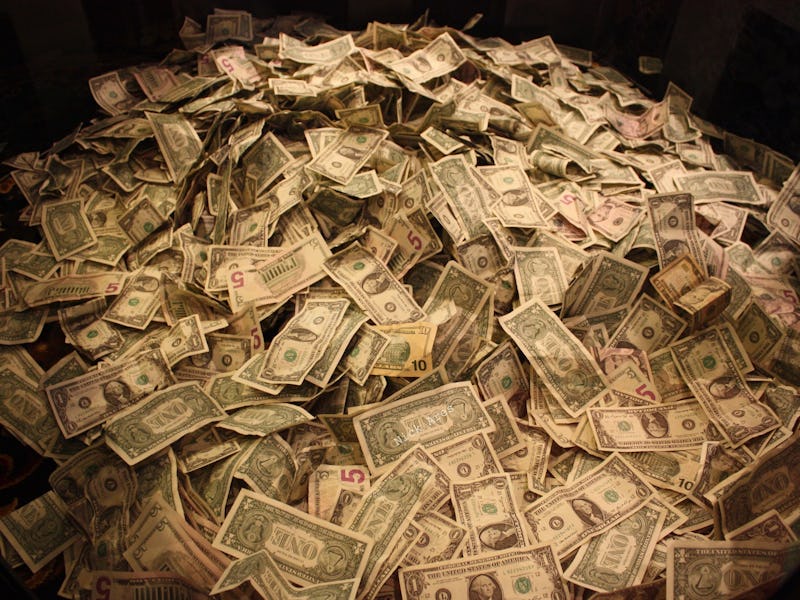A Psychology Test Explains the Real Corruption Exposed in the Panama Papers
There's an evidenced emotional response to corruption-- and it doesn't make us look very good.

A cache of 11.5 million records leaked by an anonymous source connected to the law firm Mossack Fonseca has exposed at least part of the vast network of shady financial relationships between offshore banks and world leaders. These records, known collectively as the Panama Papers, detail how the world’s elite utilize tax havens and shell companies to avoid taxes and hoard large sums of potentially ill-gotten gains. For many, the leaks confirm a basic suspicion about public servants. For others, it represents a blow from the political blind side. Either way, the 2.6 terabytes of evidence forces everyone to consider the efficacy of the structures within our societies.
The Panama Papers will inevitably become a reference on public morality and whether citizens are willfully naive or just underserved.
A number of studies have found that people act against their pure economic interests when motivated by ethical standards. It’s not unusual for lenders to make decisions counter to their own interests or politicians to act on behalf of the public rather themselves. By the same token, bribery — an act that fundamentally undercuts almost every relationship in a democratic society — is far from rare. But it is also more complicated than you might think.
Researchers have found through skin conductance tests that people feel strong emotions when choosing whether or not to accept a bribe that will bring them more cash. For centuries, the sociological assumption was that people were weighing personal gain against the good of the whole. But that’s not quite right according to a 2014 study: People just struggle to walk away from money.
You experience emotional arousal when you act against your own interests.
Writing in Frontiers in Behavioral Neuroscience, the researchers described their experimental design: They had 93 subjects participate in an experiment where they were put in an asymmetric social dilemma between an auctioneer and two bidders. Throughout the scenario, the emotional arousal of the subjects was measured through skin conductance responses (the epidermis is more conductive during states of extreme physiological response). In the first series of tests, the bidders had the option of bribing the auctioneer in order to win the auction. In the second series, the subjects were surprised to learn that agreeing to bribe meant losing the auction and their choice to bribe would be revealed to the other bidder.
Before this punishment mechanism was introduced, the researchers did see prosocial behavior — behavior categorized as better for society — on both the parts of the auctioneers and the bidders. However, when it became the loser of the auction who would gain knowledge of the bribe, bidders behaved in a far more pro-social manner. But they didn’t do it because they thought it was right: When the researchers dove into the data collected from the skin conductance test, they realized that the timing of the emotional reactions synced with when people decided not to take the cash.
“From a methodological point of view, our results suggest that, so far, emotional arousal may have been wrongly associated with only unethical behavior, because it may have been triggered by an ethical decision against the decision-maker’s selfish motivation,” write the researchers.
In other words, it’s not the choice to either violate or comply with an ethical norm that triggers an emotional reaction, but the decision to act against one’s own interest. The fear of being caught and punished by society, whether it’s judgement or real criminal penalties, is often what keeps us from being morally corrupt — while simultaneously, people are still hyper aware that they are losing something.
This confidence that they wouldn’t get caught is likely part of the reason why so many people, from Vladimir Putin’s closest friends to Jackie Chan, have been found to be involved in offshore holdings. Successful people often become over-confident people, and over-confident people are likely to hold fast to the idea that tax havens really are legal. There are legitimate reasons to have a shell company, which are often formed by startups before they obtain financing. (A shell company is a corporation that doesn’t have active business operations or significant assets).
But shell corporations are also a ripe opportunity for crooks. You can set up a company, which can have its own bank account, and pay about $15,000 a year for a “nominee” to be named on the account — hiding your tax liability from authorities. As much as offshore account holders may argue that what they’re doing is legal, the Panama Papers reveal that there is an expansive network that has worked to protect assets through manipulating official records, concealing transactions, and removing paper trails.
It’s probable that those named in the Panama Papers originally felt a moral pressure to stick to the status quo — but then realized they actually didn’t care. When you think you’re not going to get caught, the brain is pretty okay with corruption.